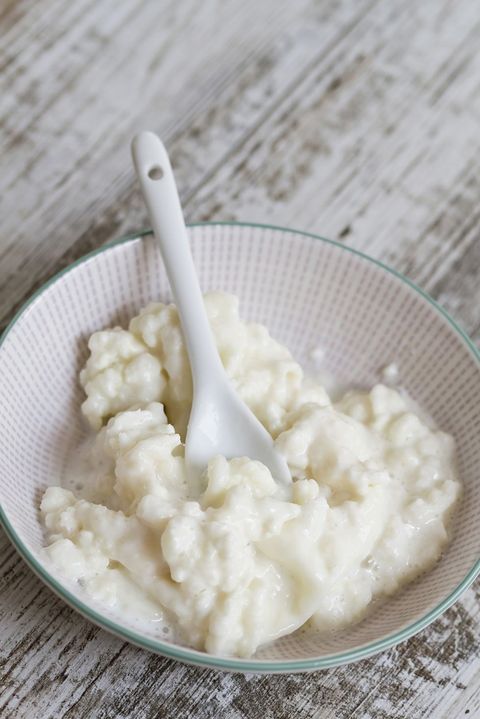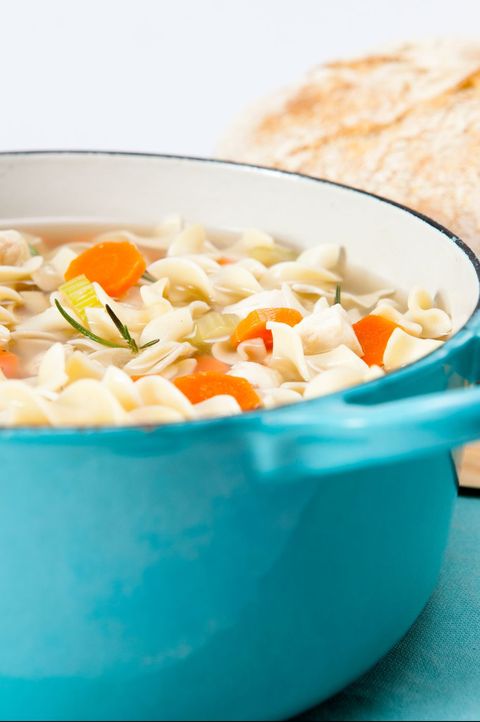Does Cheese Make Yoyr Nose Run With a Cold

LightFieldStudios Getty Images
When you're suffering through a painful head cold or can't shake a runny nose, sitting down to power through a balanced meal may feel like the last thing you want to do. But it's more important than ever to eat the right foods that will help your body feel its best. To get rid of colds or dry coughs faster, you'll need to supercharge your choices in the kitchen for a few days — look to protein-rich staples like Greek yogurt, chickpeas, seeds, chicken, and eggs to fuel your immune system when you're experiencing a loss of appetite. And your mother's old adage is true: Chicken soup can truly nourish the soul. The heat from warm soups and stews helps with congestion, so dig into one of your favorites (or even some pho!) when you're feeling sniffly or stuffed.
Keeping hydrated goes hand in hand with eating well if you're hoping to beat your cold fast. Our need for water increases when we're fighting infections, so you'll need to double down on water, comforting cups of tea, or a hot cup of coffee. Drink more than you normally would (ideally, more than 8 cups throughout the day) to help your body regenerate disease-fighting lymphatic cells naturally.
To take care of yourself year-round, load up on foods that boost your immune system, like colorful fruits and veggies. Of course, washing your hands, getting enough sleep, and receiving a flu shot can help ward off colds in the first place — but if you end up coming down with a winter bug, here's what you should eat to support an easier recovery.

fortyforks Getty Images
1 of 20
Unsweetened Greek Yogurt
Pick plain, unsweetened Greek yogurt when you're feeling under the weather. Protein-rich foods (2/3 cup of yogurt has about 20 grams!) are key to helping the cells of your immune system regenerate. Try choosing non-fat or low-fat kinds — not because of the calorie content, but because colds have a tendency to zap appetite. Since fat is filling, it's best to get enough protein by eating as much of that yogurt variety as you can.

ondacaracola photography Getty Images
2 of 20
Kefir
Many health experts often argue that kefir is actually healthier than yogurt, especially for those looking to boost their immunity during cold season (or naturally quell any digestive issues). Why? The probiotics found in this fermented beverage can contain up to 61 different strains of bacteria and yeasts, according to a nutritional profile published in Frontiers in Microbiology. Sipping on a bottled version when you're feeling sick certainly couldn't hurt.

Westend61 Getty Images
3 of 20
Honey
It's deliciously smooth, yes, and it can help soothe a burning throat that feels raw. But honey's best feature is one that you can't taste — a few teaspoons in tea can provide much needed antibacterial and antimicrobial agents to help fight off any infectious colds. A 2017 clinical review published in Pharmacognosy Research suggests honey may help the body fight off everything from throat infections to tuberculosis.

Karaidel Getty Images
4 of 20
Kale
Kale is a nutrient-dense food with tons of vitamins and minerals including vitamin A, vitamin C, vitamin K, vitamin E, iron, manganese, calcium, and potassium. Eating a diet rich in micronutrients, like the ones that kale provides, helps boost your immune system and prevent you from getting sick, according to Harvard Health Publishing.

the_burtons Getty Images
5 of 20
Red Bell Peppers
You may think of oranges as being the best produce to eat when you're feeling sick; after all, they're full of vitamin C. Surprise! Hearty bell peppers actually contain higher amounts of vitamin C, especially red varieties. It doesn't hurt that they're also sources of other important vitamins and minerals, including potassium and folate, too.

Julia_Sudnitskaya Getty Images
6 of 20
Oats
Oatmeal is a great choice when you're sick because it's bland, easy to eat, and rich in vitamins and minerals. Use Greek yogurt and water to make overnight oats — an easy, no-fuss way pack in all the nutrients you need without having to do much work.

Nungning20 Getty Images
7 of 20
Fermented Foods
Think of your gut as a personal bodyguard. Since it's the first line of defense for anything you ingest, it protects all other organs. Fermented foods — like kimchi, miso, tempeh, and sauerkraut — can protect you from colds in general thanks to their probiotics. You might also consider taking a probiotic (a.k.a. beneficial bacteria) supplement designed to prevent diseases year-round. They've been linked to reducing the duration of a cold and may decrease your likelihood of getting sick.

HD Connelly Getty Images
8 of 20
Fresh Ginger
There's a reason why many people swear by ginger ale when they're feeling nauseous or sick — while it's diluted in this kind of drink, raw, unprocessed ginger is actually predisposed to lower bacterial counts. A 2016 review found that fresh ginger contains high amounts of antibacterial properties known as gingerols, which have also been linked to lower risk of a slew of chronic diseases.

AWEvans Getty Images
9 of 20

oksix Getty Images
10 of 20
Chickpeas
Pulses like beans, peas, and chickpeas are total powerhouses. They are full of fiber and protein and play an important role in keeping our bodies healthy and strong. Fiber-rich foods like chickpeas contain prebiotics, which help the body use vitamins and minerals more efficiently. This is especially important when our bodies are under the weather.

Xsandra Getty Images
11 of 20

LauriPatterson Getty Images
12 of 20

fcafotodigital Getty Images
13 of 20

Arx0nt Getty Images
14 of 20
Spinach
Spinach has tons of vitamin A (over half of the recommended daily amount!), an anti-inflammatory vitamin that enhances immune function. Spinach also contains iron, a key mineral responsible for delivering oxygen to your cells. That's super important when you're under the weather since not getting enough can make your already lethargic self feel that much more exhausted!

KMNPhoto Getty Images
15 of 20

Luis Benitez / EyeEm Getty Images
16 of 20
Sunflower Seeds
Whether you prefer them shelled or unshelled, grab a handful of seeds as a smart snack. They provide omega-6 fatty acids, which are important for disease prevention via the immune system and general health overall.

Diana Taliun Getty Images
17 of 20
Pumpkin Seeds
Pumpkin seeds are filled with potassium, magnesium, zinc, and iron. Those minerals are key for keeping up energy. Pepitas also pack a super-satisfying combo of about 6 grams of fiber and 7 grams of protein per 1.5-ounce snack.

Neha Gupta Getty Images
18 of 20
Turmeric
You've heard about this buzzy spice before and may even see health products in the pharmacy touting its effectiveness. But if you really want to reap all of its benefits, you'll avoid supplements and simply cook with it in your kitchen; the spice version is rich in an antioxidant known as curcumin, which has been used as a health remedy for centuries. Curcumin itself can help ward off foreign bacteria, including viruses, after you've come into contact with them.

YSedova Getty Images
19 of 20
Water
Drinking fluids when sick is crucial to prevent dehydration, which makes us feel even worse. Staying hydrated will also prevent headaches, help with temperature regulation, and assist our kidneys in flushing out toxins.
RELATED: This Is How Much Water Should You Drink Every Day

monkeybusinessimages Getty Images
20 of 20
Zinc Lozenges
Zinc supplementation has been shown to reduce the length of your cold by 33%, plus these lozenges will help soothe your throat. And while I rarely recommend nutrients in supplement form, there's nothing wrong with a little placebo effect (and some throat-coating benefit).
Does Cheese Make Yoyr Nose Run With a Cold
Source: https://www.goodhousekeeping.com/health/diet-nutrition/g28541223/what-to-eat-when-you-have-a-cold/